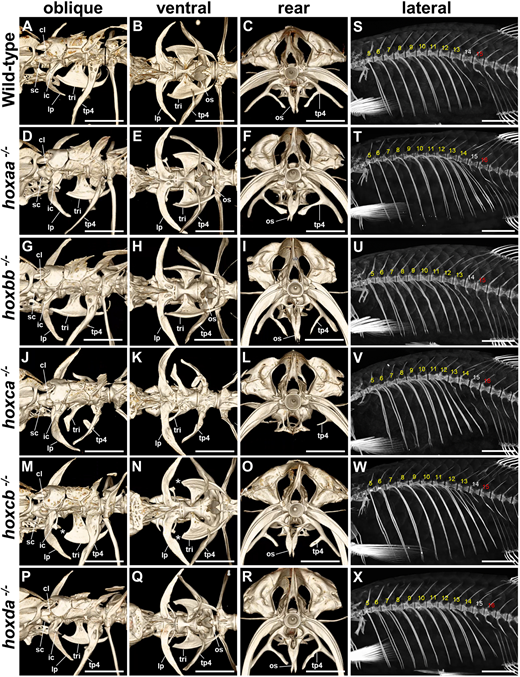Fig. 4 Anterior homeotic transformation of the Weberian apparatus and pleural-to-caudal vertebrae inhoxcluster mutants. (A-R) The anteriormost vertebrae including the Weberian apparatus in wild-type zebrafish and hox cluster mutants were examined by micro-CT scanning and are shown as 3D-VR images. The Weberian apparatus is composed of the four ossicles including the tripus (tri), intercalarium (ic), scaphium (sc) and claustrum (cl), in the anteriormost vertebrae. Other ossicles such as the os suspensorium (os), transverse process of vertebra 4 (tp4) and lateral process (lp) are indicated in the panels. (S-X) Pleural ribs in wild-type and hox cluster mutants (n=7 for wild-type; n=4 for hoxaa−/−; n=2 for hoxbb−/−; n=3 for hoxca−/−; n=4 for hoxcb−/−; n=2 for hoxda−/−) were subjected to micro-CT scan analysis, and representative images are shown. The number represents the position of a vertebra from the first vertebra. The yellow number indicates the vertebra possessing the pleural ribs. The white number indicates the vertebra possessing the short ribs. The red number indicates the vertebra possessing the hemal arch that extends to the anteriormost radial in the anal-fin ray. In Table S1, the vertebral phenotypes are summarized and two hoxca−/− fish stained with Alizarin Red were included. hoxbb−/− and hoxda−/− are male and wild-type, hoxaa−/−, hoxca−/− and hoxcb−/− are female. Movies 1-10 show micro-CT scans. Scale bars: 1 mm (A-R); 2 mm (S-X).
Image
Figure Caption
Figure Data
Acknowledgments
This image is the copyrighted work of the attributed author or publisher, and
ZFIN has permission only to display this image to its users.
Additional permissions should be obtained from the applicable author or publisher of the image.
Full text @ Development

